Labor Sovereignty 2026: The Encyclopedic Thesis on the Ministry of Human Resources and Cadre Governance in the Saudi Fortress
Association with the Ministry of Human Resources in Saudi Arabia in 2026 represents the fundamental pillar for regulating contractual relationships and protecting the operational solvency of billion-dollar enterprises. The Ministry is no longer merely a regulatory body; it has become a Formulating of a digital human empowerment ecosystem that links Saudization strategies with the actual needs of the global market under the umbrella of Vision 2030. We at Motaded believe that mastering the tools of the Qiwa Platform in Saudi Arabia is what grants investors procedural sovereignty. The 2026 legislative environment provides a flexible labor system that supports Freedom of Ownership in Saudi Arabia 100% Foreign Ownership, consolidating the establishment's prestige in managing its human resources with absolute informational integrity.
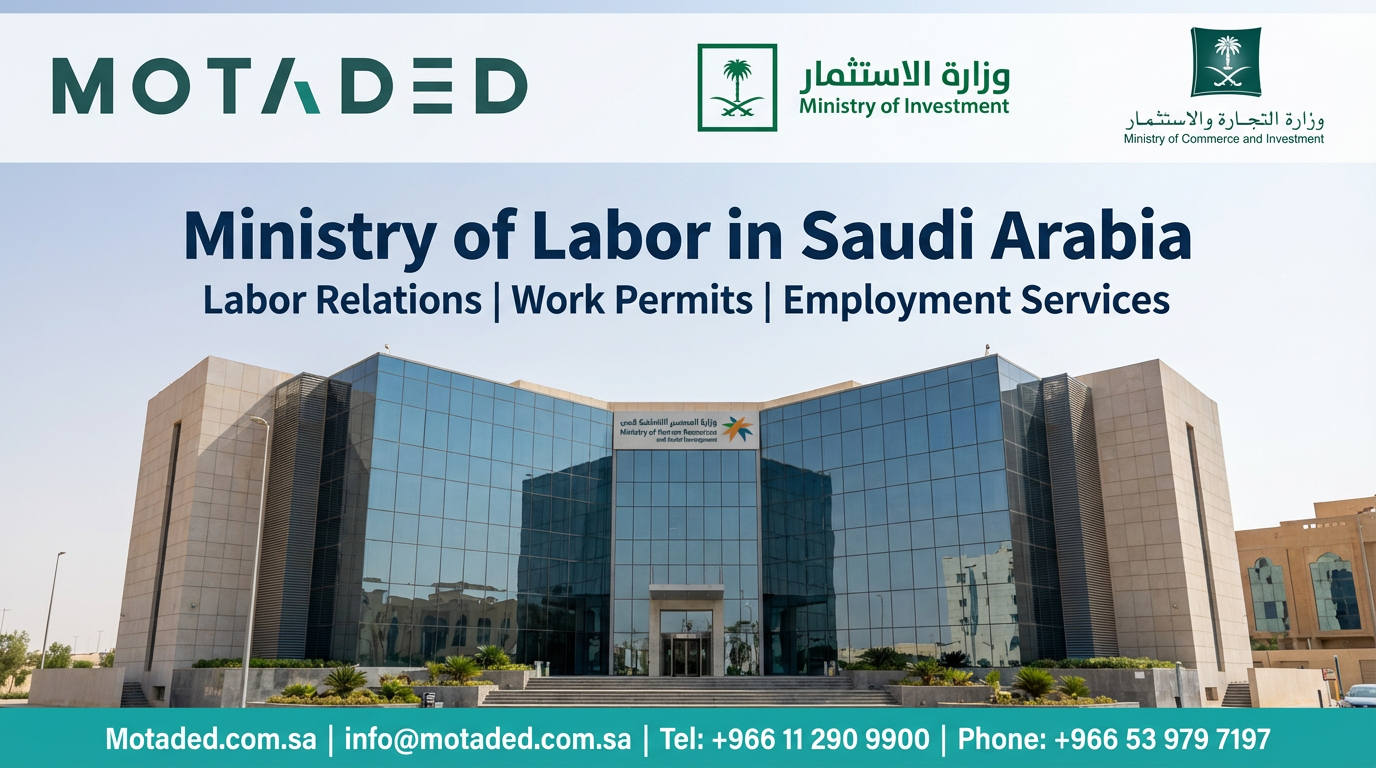
1. The Sovereign Philosophy of the Ministry of Human Resources in the 2026 Ecosystem
The philosophy of the Ministry of Human Resources and Social Development (MHRSD) in 2026 is based on the principle of "Balanced Development and Digital Empowerment," merging the former Ministry of Labor with Social Development to form a sovereign entity overseeing all professional and social aspects of an individual's life. As a leading Consulting Firm in Saudi Arabia for Investors, we observe that this merger has created a legally fortified environment ensuring the rights of both employer and employee through the "Unified Labor Contract." The state aims, through this sovereign organization, to raise the productivity of national cadres and attract global talent to contribute to the construction of the impenetrable Saudi economic fortress.
Sovereignty in 2026 means the Ministry has become the "Strategic Engine" of the labor market, where education outcomes are linked to billion-dollar employment opportunities in real-time. At Motaded, we guide our clients to exploit the Ministry's tools not just for legal compliance, but as a tool for achieving operational sustainability. Joining this ecosystem means your facility will be part of a smart work environment, where all recruitment, service transfer, and compliance requests are managed with absolute informational integrity ensuring the protection of your human assets and financial solvency before international and local regulatory bodies, enhancing your brand prestige for 2026.
2. Digital Harvest: Labor Market Statistics and Human Growth (2026 Data)
To ensure absolute informational integrity, the following table documents the digital transformation and growth in manpower indicators for 2026 according to data from the Ministry of Human Resources and the General Authority for Statistics:
| Labor Performance Indicator 2026 | Achieved Value (or %) | Digital Transformation Rate | Documenting Authority |
|---|---|---|---|
| Total Private Sector Employees | +11,500,000 Employees | 100% (Digital Sovereignty) | MHRSD |
| Qualitative Saudization Rate | 38.5% | Strategic Growth | Ministry of Commerce |
| Digitally Documented Contracts | +9,800,000 Contracts | Instant (Real-time) | Sovereign Qiwa Platform |
| Wage Protection Compliance Rate | 98.2% | Procedural Leadership | SAMA |
These metrics reflect the regulatory solvency enjoyed by the Saudi labor fortress, providing a secure environment for international investors to effectively manage their cadres.
3. Procedural Sovereignty via the "Qiwa" Platform 2026
The "Qiwa" platform in 2026 represents the beating heart of human resource management in the Kingdom, where all labor services have been unified into a single sovereign interface. The platform has eliminated traditional bureaucracy, allowing establishments to Construct their labor records and update them with extreme immediacy. At Motaded, we analyze platform data to ensure our clients' compliance with "Saudization Certificate" and "Labor Regulation" requirements, providing them with procedural immunity in all their billion-dollar government transactions.
Sovereignty in using the Qiwa platform lies in "Absolute Transparency" between the establishment and the Ministry. Informational integrity in this sector means that every visa issued or service transfer request executed serves the establishment's strategic interest and its alignment with required Saudization percentages. We assist companies in documenting their employees' contracts and utilizing the platform's "Electronic Consultant" services, enhancing the establishment's operational solvency and making it a trusted target for major contracts. Digital sovereignty via Qiwa is the ultimate guarantee for human cadre stability and achieving leadership in the Saudi labor market for 2026.
4. Governance of the Wage Protection System (WPS) and Financial Salary Sovereignty
The Wage Protection System in 2026 has become the primary guarantor of financial transaction integrity between the establishment and the employee. Financial sovereignty means mastering salary cash flow management through the "Mudad Platform" and direct linking with sovereign banks. At Motaded, we help investors understand the Steps for Business Setup in KSA, which require activating the Wage Protection System immediately upon start, ensuring the avoidance of procedural violations that could lead to service freezing.
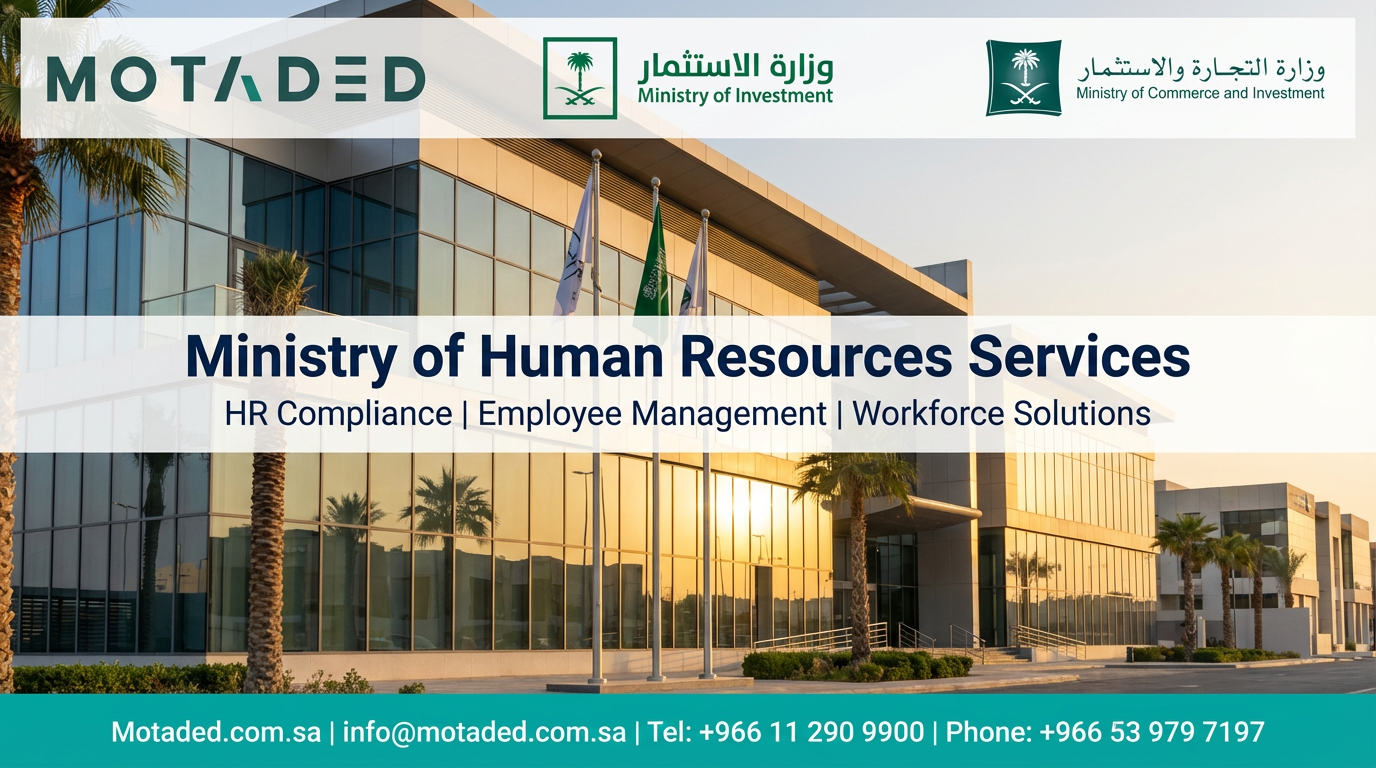
Compliance with integrity standards in wage disbursement is a sovereign condition that raises the facility's ranking in the "Developed Nitaqat" program. In 2026, the system was linked with AI to monitor any delays or shortages in salary payments in real-time, protecting the employer's legal solvency. We ensure our clients that their wage files are organized according to the highest sovereign standards, granting them priority in obtaining professional visas, consolidating the establishment's administrative sovereignty against global labor market challenges, and achieving billion-dollar productivity.
5. Sovereignty in the "Developed Nitaqat" Program and Billion-Dollar Human Representation
The "Developed Nitaqat" program in 2026 represents the "Sovereign Yardstick" for measuring establishments' success in qualitative Saudization. Sovereignty here means the investor's ability to maintain a "High Green" or "Platinum" range to ensure obtaining exceptional facilities in recruitment and service transfers. At Motaded, we provide strategic consultations for firms wishing to Establish a Company in Saudi Arabia to design their organizational structure to ensure sustainability in safe zones.
Staying in high ranges requires high informational integrity in updating General Organization for Social Insurance (GOSI) data and linking with the Qiwa platform. In 2026, the Ministry grants financial and training incentives to facilities that exceed Saudization targets. We assist companies in building Saudization strategies based on efficiency rather than just numbers, granting them a foothold in billion-dollar government projects that mandate specific local human content percentages. Sovereignty in Nitaqat management means building a facility fortified by regulations and capable of rapid growth in the heart of the Saudi economic fortress.
6. Governance of Recruitment Offices and Manpower Firms (Global Cadre Sovereignty)
Recruitment offices and manpower firms in 2026 have transformed into strategic partners under strict sovereign oversight through the "Musaned Platform." Sovereignty in bringing cadres means ensuring the arrival of skilled labor with documented contracts that protect all parties' rights and prevent human trafficking. At Motaded, we handle the Formulating of cooperation agreements between our clients and major recruitment firms to ensure the supply of specialized technical cadres with the highest standards of procedural integrity.
In 2026, professional recruitment is conducted based on "Professional Verification Tests" overseen by the Ministry to ensure the quality of expatriate labor. Excellence in this path requires association with Professional Staff in Saudi Arabia holding sovereignly accredited certificates. We provide logistical support services to assist establishments in finishing procedures for issuing and documenting professional visas. Sovereignty here lies in the ability to protect the investor's operational solvency by recruiting cadres who actually contribute to billion-dollar growth, enhancing investment trust in the 2026 Saudi work environment.
7. Sovereignty in Labor Dispute Settlement and Digital Reconciliation
The "Amicable Settlement" activity in 2026 represents the first sovereign stage for resolving disputes between employers and employees without resorting to labor courts, thanks to full digitization via the Qiwa platform. Judicial sovereignty here means resolving differences professionally and rapidly, ensuring the workflow in billion-dollar projects is unaffected. At Motaded, we assist companies in obtaining a MISA Investment License that mandates commitment to local labor policies and grants them legal immunity when attending reconciliation sessions.
Compliance with "Contractual Justice" standards is a sovereign condition for stability in 2026. Informational integrity in presenting evidence and documents before settlement committees ensures the investor protects his financial rights. We provide legal support and representation services in reconciliation sessions to ensure our clients achieve the best results that preserve the establishment's prestige and solvency. Sovereignty in dispute resolution means building a transparent work environment protected by regulations, facilitating the retention of global talent and consolidating the establishment's position as a preferred employer from Riyadh.
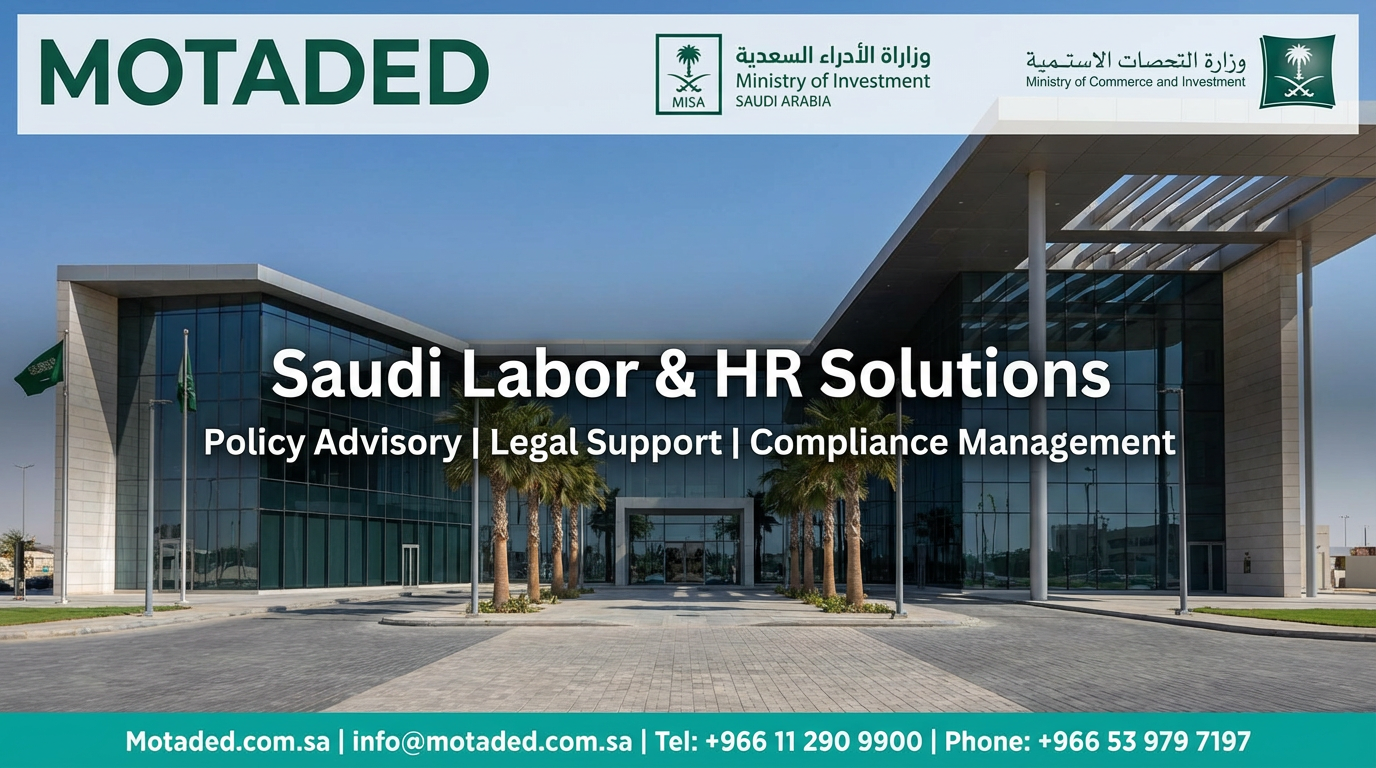
8. Governance of the "Ajeer" Platform and Sovereignty in Cadre Secondment
The "Ajeer" platform in 2026 has become the driver for labor market flexibility, allowing the secondment of human cadres between establishments in a legal and sovereign manner. Sovereignty here lies in the investor's ability to meet temporary specialized labor needs without the need for new recruitment, saving costs and raising operational solvency. At Motaded, we facilitate linking procedures with "Ajeer" to ensure our clients obtain sovereignly documented secondment permits for their Professional Staff in Saudi Arabia.
In 2026, the Kingdom grants sovereign accreditations to "Ajeer" contracts to enhance cooperation between different sectors like tourism and construction. Informational integrity in documenting tasks assigned to seconded workers is the pillar upon which achievement efficiency is built. We assist companies in Organizing secondment files to comply with Ministry regulations, ensuring the investor a flexible human solvency capable of keeping pace with the pressure of Giga-projects. Sovereignty lies in possessing cross-establishment HR management tools with integrity and professionalism.
9. Sovereignty in Vocational Training and "SCAN" Accreditation 2026
The National Training Platform "SCAN" in 2026 represents the sovereign incubator for developing human cadre skills according to national professional standards. Knowledge sovereignty means providing training programs aligned with the "Saudi Unified Classification of Occupations" to ensure employee suitability for their billion-dollar positions. At Motaded, we guide investors to benefit from Human Resources Development Fund (HADAF) initiatives integrated with the SCAN platform, ensuring protection of their human capital investments.
Investing in employee training for 2026 requires compliance with the Updated Labor Law which mandates allocating a percentage of work hours for professional development. Procedural sovereignty ensures establishments obtain "Training Compliance" certificates that raise their sovereign ranking. We ensure our clients formulate accurate training plans enhancing their chances for billion-dollar "HADAF" support to cover trainee wages, making the establishment a center for knowledge excellence and professional sovereignty in 2026, achieving sustainable growth.
10. Governance of Occupational Health and Safety (Human Asset Protection Sovereignty)
Occupational Health and Safety (OHS) activities in 2026 witnessed a radical shift toward "Smart Oversight" under the "National OHS Program." Sovereignty here lies in protecting lives at billion-dollar construction and industrial sites to ensure "Zero Injuries." At Motaded, we assist international facilities in Constructing safety management systems to ensure compliance with the "Saudi Safety Code," ensuring direct access to sovereign projects in Vision 2030.
In 2026, OHS compliance is monitored via drones and smart wearable systems linked to the Ministry's operation rooms, ensuring professional environment sustainability. Informational integrity in submitting accident reports and preventive measures is what grants the facility absolute trust from global insurance companies. We provide legal consultations for Employee Insurance in Saudi Arabia, opening horizons for building world-class work environments fitting the Kingdom's prestige as a bastion of professional security and human sovereignty in 2026.
11. Sovereignty in "Remote Work" and Flexible Work Activities 2026
Work patterns in 2026 have transformed into "Sovereignly Flexible" systems relying on cloud technologies, where the Ministry oversees documenting remote work contracts to ensure party rights. Digital sovereignty here means the establishment's ability to attract talent from all over the Kingdom or the world and employ them officially via the "Remote Work Platform." At Motaded, we assist tech firms in activating these patterns, ensuring business continuity and informational integrity in virtual productivity management.
Investing in flexible work systems in 2026 grants the facility the advantage of reducing office operational costs while maintaining high productivity solvency. Informational integrity in digital performance measurement platforms is the pillar upon which trust between the virtual manager and employee is built. We assist companies in building internal regulations aligned with the "Flexible Work System," enhancing the facility's operational solvency and making it part of the Kingdom's sovereignty in the modern work economy. Investing in recruitment flexibility is an investment in billion-dollar administrative intelligence for 2026.
12. Governance of "Professional Verification" and Expatriate Skill Sovereignty
The "Professional Verification" program in 2026 represents the "Qualitative Sovereignty" pillar for expatriate labor, as the Ministry ensures the recruitment of only those possessing documented actual skills. At Motaded, we assist investors in Company Registration in Saudi Arabia and obtaining professional verification accreditations for their training centers, ensuring labor alignment with Saudi technical standards.
In 2026, professional verification results are linked to the worker's digital identity in the Qiwa platform to ensure informational integrity and prevent professional commercial concealment (Tasattur). This sovereign organization raises execution quality in billion-dollar projects and achieves labor market efficiency targets. We provide consultations for Human Skill Governance to ensure professional classification requirements are met. Sovereignty in the skills sector means building a professional workforce capable of leading advanced industries, ensuring sustainable technical and financial solvency for the facility.
13. Sovereignty in Smart Labor Inspection and Oversight Activities
Labor inspection rounds in 2026 rely on "Digital Inspection" and AI to monitor violations without the need for intensive field visits. Regulatory sovereignty means ensuring establishments' commitment to Saudization percentages, labor housing, and wage protection through data analysis algorithms. At Motaded, we guide investors to adopt "Voluntary Compliance Systems" that raise facility ranking and avoid billion-dollar fines.
Compliance with the "Labor Ethical Charter" is a sovereign condition that raises establishment reputation in 2026. Informational integrity in digital records ensures establishment transparency before the Ministry's virtual inspectors. We assist companies in designing internal oversight systems achieving sovereign compliance standards, granting them a competitive edge in obtaining institutional excellence certificates. Excellence in self-regulation is a guarantee for legal and professional solvency, making the establishment an administrative fortress capable of growth in a strict and fair regulatory environment for 2026.
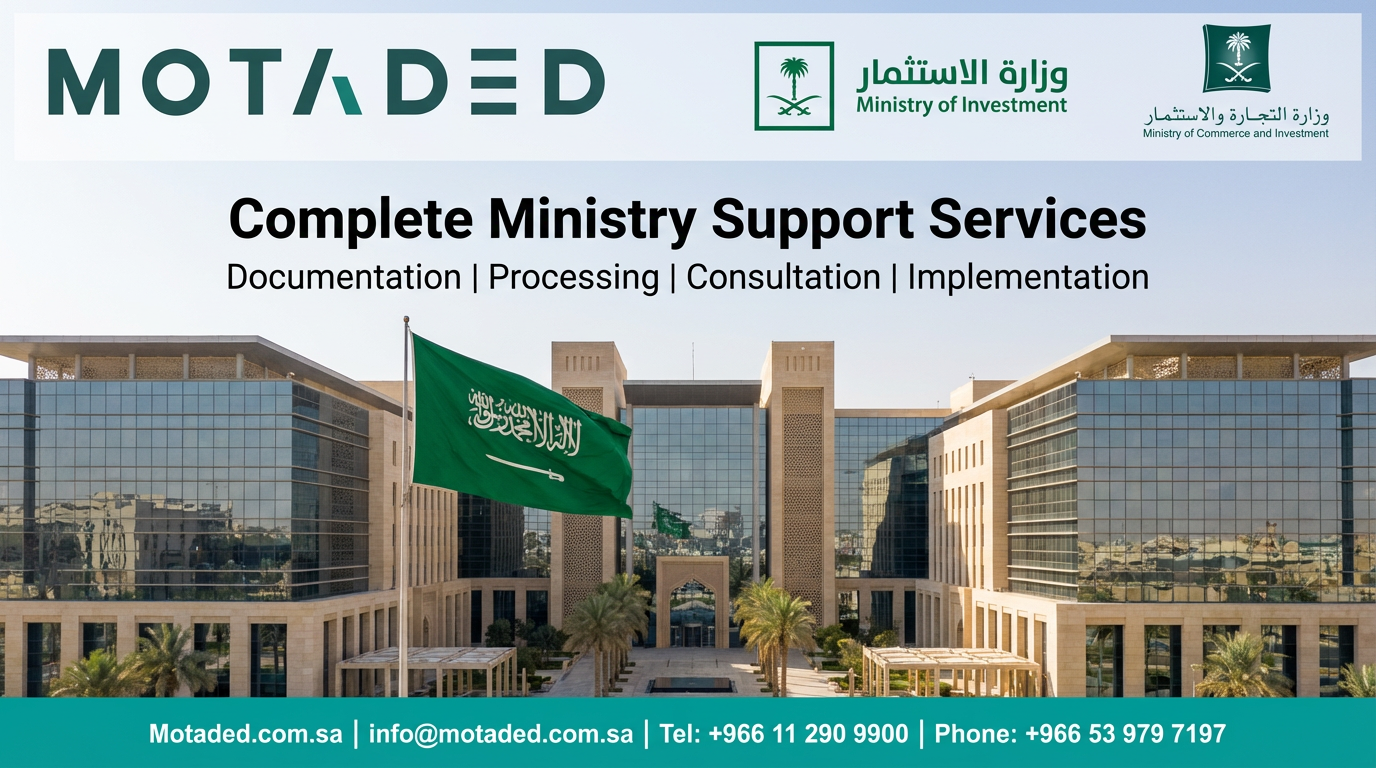
14. Governance of the "Contractual Relationship Improvement Initiative"
The Contractual Relationship Improvement Initiative (abolishing the traditional sponsorship system) in 2026 represents the sovereign engine for attracting global talent. Sovereignty here lies in granting the expatriate worker the freedom of job mobility, exit, and re-entry via the Absher and Qiwa platforms, creating a competitive labor market based on efficiency rather than restriction. At Motaded, we assist international firms in complying with updated Investment and Labor Regulations to ensure the retention of their creative employees.
In 2026, cadre transfer is monitored via performance indicators ensuring no harm to the interests of compliant establishments. Informational integrity in documenting the "Notice Period" and penal clauses is the pillar upon which employer protection is built. We provide consultative support services to draft flexible labor contracts that respect legal sovereignty and preserve billion-dollar business secrets. Sovereignty in improving contractual relationships means building a global labor market that immortalizes the Kingdom as the best work destination in the 21st century.
15. Sovereignty in HR Consulting and Leadership Development
HR consulting activities provided in coordination with the Ministry in 2026 have become the thinking brain for building future leaders. Consulting sovereignty means providing solutions based on "Human Capital" analysis and informational integrity to raise billion-dollar performance efficiency. At Motaded, as a leading firm in Management and Leadership Consulting, we provide a model for commitment to procedural sovereignty in formulating replacement and leadership succession plans.
Compliance with updated "Leadership Merit Standards" of 2026 is a sovereign condition ensuring the quality of administrative leaders in the Saudi fortress. Informational integrity in leadership assessment tests protects facilities from mismanagement risks and facilitates billion-dollar expansion. We assist companies in linking with the Ministry's "National Leadership Academy," raising executive managers' knowledge solvency. Sovereignty in the human consulting sector lies in the ability to formulate a corporate culture contributing to Saudi global leadership, making HR a true partner in 2026 prosperity.
16. Governance of "Labor Indicators" and Business Intelligence Sovereignty
The "Labor Market Business Intelligence" activity provided by the Ministry in 2026 represents the peak of commitment to informational transparency. Informational sovereignty means establishments' access to precise data on wage averages, job turnover rates, and rare specializations in each sector. At Motaded, we assist companies in Establishing their RHQ in Saudi Arabia to exploit this data in drawing billion-dollar recruitment strategies.
In 2026, facility performance is linked to market indicators to ensure fair competitiveness and financial integrity. Sovereignty here lies in possessing a "Proactive Vision" enabling the facility to anticipate changes in labor regulations. We provide consultations for Human Data Governance, granting the facility strategic immunity against cadre scarcity and enhancing the operational solvency of global brands. Using labor indicators means building a facility based on sovereign facts and figures, making the Kingdom the most trusted and attractive market for talent in 2026.
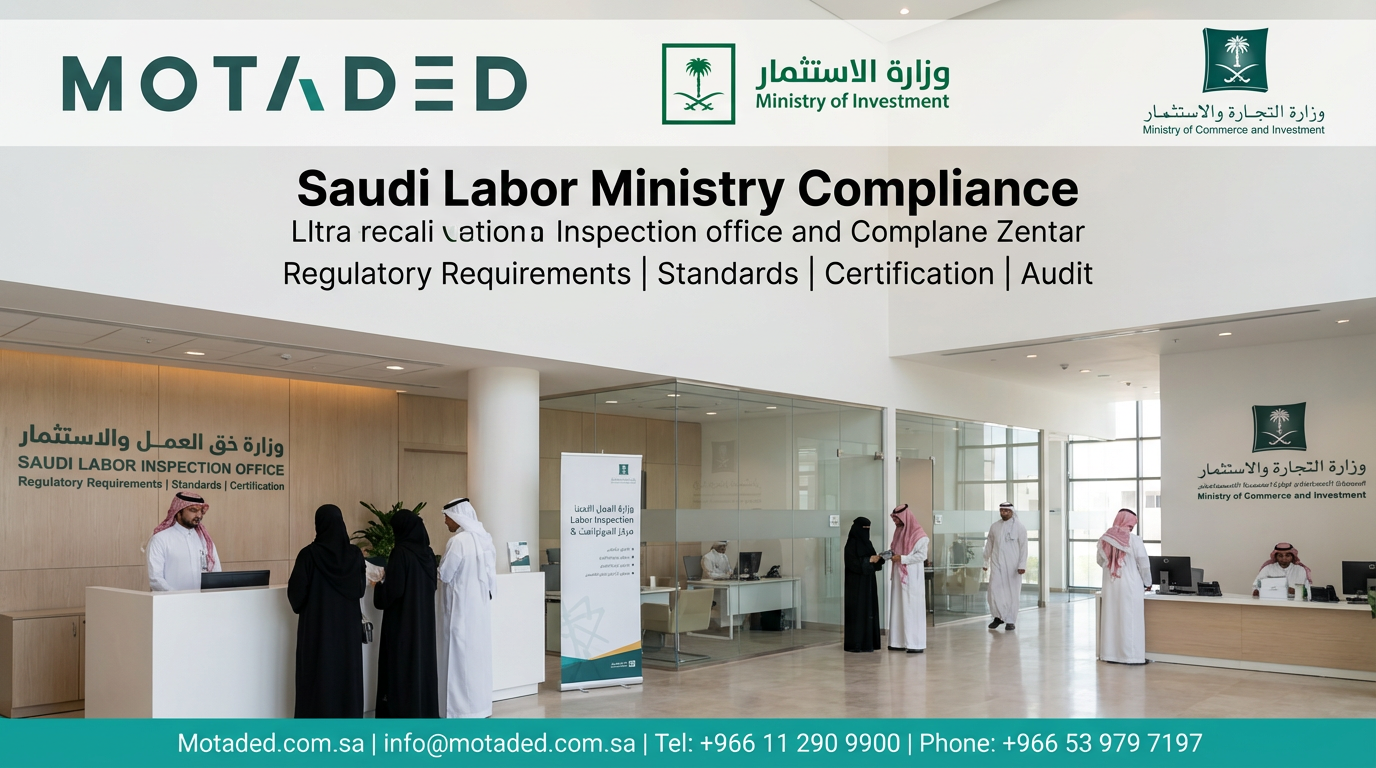
17. Sovereignty in "Parallel Saudization" and Financial Support Activities
"Parallel Saudization" programs in 2026 have transformed into sovereign tools to support the financial solvency of facilities facing challenges in achieving actual Saudization percentages. Sovereignty here lies in providing financial alternatives that contribute to the Human Resources Development Fund to finance the training of national cadres in other sectors. At Motaded, we assist companies in calculating "Compliance Cost" and choosing the most economically feasible paths to ensure procedural integrity.
Investing in government support programs in 2026 grants the facility access to reductions in recruitment fees and billion-dollar visas. Informational integrity in submitting employee payrolls is what raises facility evaluation in the Qiwa platform. We provide financial and labor audit services to ensure activities are free from "Fake Saudization," achieving ethical and legal solvency for the investor. Sovereignty in the Saudization support sector means building a solidarity economy that supports national skills, making the Kingdom a fortress for shared growth between the investor and the state.
18. Governance of "Labor Housing" and Professional Quality of Life Sovereignty
Ministry-approved "Labor Housing" standards in 2026 have become the protective shield for public health and human integrity in the Saudi fortress. Procedural sovereignty requires the facility's labor housing to obtain a "Spatial Compliance License" ensuring the provision of all essential digital and health services. At Motaded, we assist construction and industrial firms in activating their linking with the Sakan Platform and sovereign platforms to ensure integrity in municipal and labor documentation.
In 2026, housing quality is monitored via virtual tours and smart cameras ensuring transparency and informational safety. Sovereignty here lies in the ability to provide a living environment that raises employee loyalty and billion-dollar productivity. We provide consultations to improve welfare standards in labor complexes and reduce epidemic and accident risks, enhancing the facility's financial solvency through reduced health downtime, consolidating the prestige of the Saudi labor system as a global model in cadre care for 2026.
19. Sovereign Inquiries on the Ministry of Human Resources 2026 (FAQ)
Here are the 9 fundamental inquiries to ensure your informational sovereignty and procedural integrity when dealing with the Ministry in the Saudi fortress for 2026:
- What is Qiwa platform's role in supporting Vision 2030? It is the sovereign engine for enabling establishments to manage their human resources digitally and link them with billion-dollar Saudization plans.
- Is digital contract documentation mandatory for all employees in 2026? Yes, membership and documentation via Qiwa are the fundamental pillars for activating government services and ensuring parties' legal rights.
- How are "Instant Visas" activated for establishments in 2026? Automatically for facilities in high ranges via sovereign linking with the Saudi Business Center, ensuring speed and operational solvency.
- What is PDPL's impact on employee files? It ensures personal data and payroll privacy and mandates high encryption standards on Ministry platforms to ensure digital sovereignty.
- Can foreign investors recruit 100% executive managers? Yes, 2026 regulations grant high flexibility to MISA-licensed establishments to enhance administrative sovereignty and attract global expertise.
- How does "Amicable Settlement" contribute to reducing legal costs? By providing rapid online dispute resolution solutions avoiding long labor court litigation.
- What is the penalty for non-compliance with the Wage Protection System in 2026? A grave violation of procedural integrity leading to cessation of all Ministry services and major financial fines per employee.
- Can an expatriate worker transfer service without employer consent? Yes, according to 2026 "Contractual Relationship Improvement" guidelines ensuring balance and sovereignty in a competitive market.
- What is the advantage of consulting Motaded when dealing with the Ministry? We guarantee procedural integrity, raising your facility's Nitaqat range, and absolute compliance with all 2026 labor system updates.
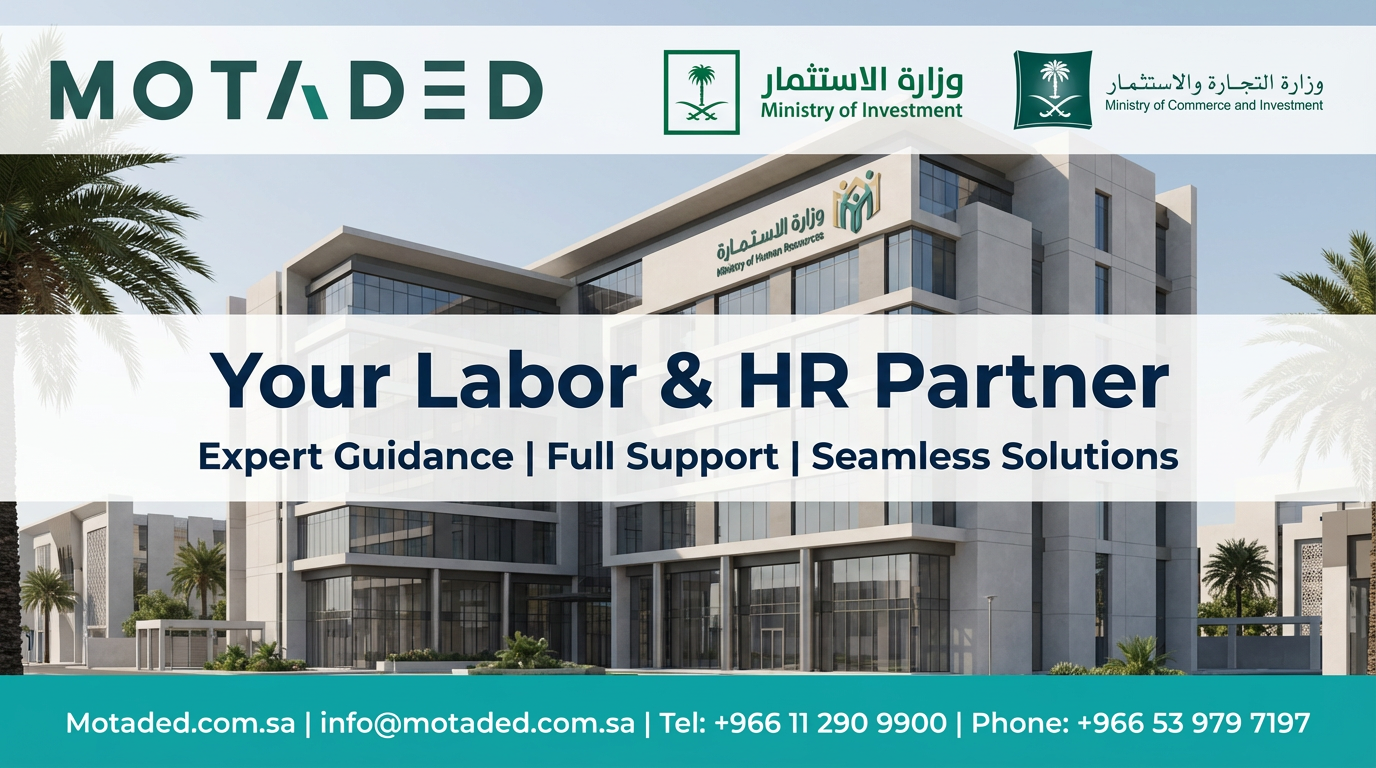
20. Executive Summary and Labor Sovereignty 2026
Associating with the Ministry of Human Resources and Social Development in Saudi Arabia for 2026 is the decisive step toward building a sustainable facility in the new global economic fortress. Stunning digital development via Qiwa and Mudad platforms, procedural sovereignty in wage protection, and legislative clarity under Vision 2030 have made the Saudi labor market the most attractive environment for billion-dollar capital and creative cadres. At Motaded, as your strategic and sovereign partner, we are committed to overcoming all obstacles and providing technical support to ensure your success and sustainable growth in the land of opportunity.
Your successful investment today begins with understanding HR's role as a sovereign partner in protecting your operational solvency. We ensure absolute compliance and procedural sovereignty at every step, confirming that the Saudi labor fortress opens its doors to every ambitious professional leader. With proper planning and a refined Market Entry Strategy in KSA, your billion-dollar ambitions will transform into a reality building the global economy's future from the heart of Riyadh for 2026, the capital of business and human sovereignty.